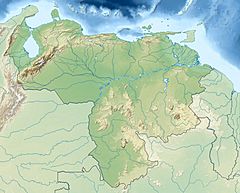Pristimantis cantitans facts for kids
Quick facts for kids Pristimantis cantitans |
|
|---|---|
| Conservation status | |
| Scientific classification |
|
| Kingdom: | Animalia |
| Phylum: | Chordata |
| Class: | Amphibia |
| Order: | Anura |
| Family: | Strabomantidae |
| Genus: | Pristimantis |
| Species: |
P. cantitans
|
| Binomial name | |
| Pristimantis cantitans (Myers and Donnelly, 1996)
|
|
| Script error: The function "autoWithCaption" does not exist. | |
| Synonyms | |
|
|
Script error: No such module "Check for conflicting parameters".
The Pristimantis cantitans is a special kind of frog. It belongs to a group of frogs called Strabomantidae. This frog is only found in one place: the country of Venezuela. It lives on top of a mountain called Cerro Yaví.
Cerro Yaví is a very tall, flat-topped mountain. These mountains are known as tepuis. The frog was first discovered on this mountain, which is about 2,150 meters (7,050 feet) above sea level. The name cantitans comes from a Latin word meaning "to sing often." This is because these frogs love to call out day and night!
Contents
What Does the Pristimantis cantitans Look Like?
These frogs are not very big. Male frogs are usually about 2.5 to 3.5 centimeters (1 to 1.4 inches) long. Female frogs are a bit larger, growing to about 3.2 to 4.5 centimeters (1.3 to 1.8 inches) long. This measurement is taken from their snout (nose) to their vent (bottom).
Their bodies are mostly brown. Some frogs have darker spots or patterns. Others might have a lighter brown back with wavy, dark brown markings. Some even have small yellow spots!
Skin and Features
The skin on their back is a little bumpy, but not too rough. This is called "weakly granular and rugose." Their belly skin is covered in small, raised areas, which is called "areolate."
They have a clear eardrum, called a tympanum. Their snout, or nose area, is round. They also have tiny bumps, like small warts, on their upper eyelids.
Their toes have small folds of skin on the sides, called "lateral fringes." They also have a bit of skin between their toes near the bottom, which is "basal webbing." However, their fingers do not have any webbing.
Where Does the Pristimantis cantitans Live?
This frog lives in the forests on top of the tepui mountains. It has been found living on plants in these high-up, misty forests.
Calling Habits
Even though these frogs are mostly active at night, the males sing during both the day and night. They like to hide when they call. You might hear them calling from inside small caves or from under thick mats of moss that grow over the sandstone rocks.
Conservation Status
Scientists do not know of any major threats to this frog species right now. It lives in a very specific and somewhat isolated habitat.
See also
 In Spanish: Pristimantis cantitans para niños
In Spanish: Pristimantis cantitans para niños
 | Bayard Rustin |
 | Jeannette Carter |
 | Jeremiah A. Brown |



